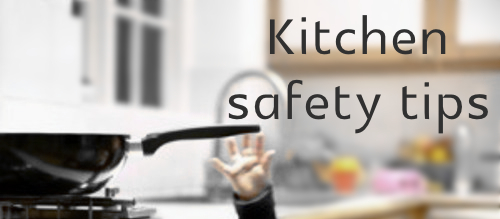Since many of our posts are related to food preparation, we thought it would be a good idea to turn to the experts for some basic tips on how to stay safe in the kitchen. And while most of these tips seem a bit obvious, you might agree they aren’t always on the top of your mind when preparing meals. So here’s a quick and helpful refresher on how to keep your kitchen, and loved ones, safe!

The Basics of Staying Safe in the Kitchen
The kitchen is a vital place for many of us; we make our greatest dishes here and share them with loved ones, friends, and more. When performing these crucial tasks, we need to stay safe – while there is plenty that can go wrong in the kitchen when it comes to safety, prevention is a very simple task that cooks of all levels can manage.
First, you need to go over several items regarding the appliances in your kitchen. Check and make sure that all the cords and wires connected to your appliances are not frayed (i.e. split apart) and/or exposed (i.e. seeing the actual wire inside of the plastic protective layer). Either of these factors can cause fires or electric shocks if left unchecked. If you need more plug-in space, don’t use extension cords. Instead, use a junction box with a GFI to protect from power surges as well as provide more plugs as needed. Furthermore, if any of your appliances themselves are damaged, replace them. Malfunctioning appliances are unpredictable – don’t press your luck. As for cleaning the equipment, ALWAYS have it unplugged before trying to clean it, or even for picking out any items accidentally jammed inside of them.
Next, let’s worry about heat-related injuries. The most basic thing to know is to NEVER leave the kitchen while anything is cooking on a stove – it may catch fire while you’re away. In addition, turn off those stove burners as soon as you remove the pot/pan that was being cooked on it. Keep all fabric (loose clothing, towels, oven mitts, etc) away from the stove – fire WILL spread quickly to these items if you aren’t careful. Another way to prevent fire is to keep any and all cleaning chemicals away from any sources of heat, such as an oven. Some chemicals may be very reactive to high levels of heat and cause all sorts of problems if they combust. In case a fire does happen, make sure you have a fire extinguisher nearby and easily accessible. If the fire is large or otherwise out of your control, move away from the burning areas as quickly as possible and call 911 immediately.
One more area to look at is the ever-dangerous sharp edge. When it comes to those edges in appliances, such as in blenders and electric can openers, make sure that they are unplugged from any power source before touching their edges. For knives, always cut away from you, use a cutting board, and keep them clean. However, don’t clean them with other items in soapy water – you may not be able to see it when trying to retrieve it and cut yourself. To further prevent cutting accidents, don’t let yourself slip off a wet floor – wipe it up immediately.
Hopefully these tips can keep you (and anyone else in the kitchen with you) safer. Happy cooking!
About the Author – This article is contributed by Manilyn Moreno, on behalf of Better Cater, a company providing software for catering that is easy to learn and use.
